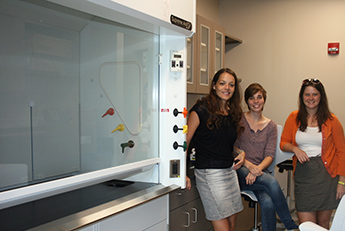Pre-Doctoral Training in Addiction Science
 We offer our graduate students pre-doctoral training in research on addiction science, supported by a training grant from the National Institute on Drug Abuse held since 1990.
We offer our graduate students pre-doctoral training in research on addiction science, supported by a training grant from the National Institute on Drug Abuse held since 1990.
Our Pre-Doctoral Training in Addiction Science Grant provides Psychology and Neuroscience and Neurobiology students interdisciplinary, graduate training in research areas related to drug and alcohol abuse. The objective of this program, with 35 years of continued funding, continues to be the preparation of predoctoral students for research careers. Training laboratories are located at several sites at the University of North Carolina Chapel Hill, including the Departments of Psychology and Neuroscience, Pharamcology, and Psychiatry, Neurobiology, and Bowles Center for Alcohol Studies.
 The University of North Carolina at Chapel Hill provides an excellent environment for training pre-doctoral students to conduct research in addiction science. First of all, the training program includes a cohesive core of faculty mentors, including the major of its faculty members located within the Behavioral and Integrative Neuroscience program. Additional faculty members are drawn from the Departments of Pharmacology, Psychiatry, and the Bowles Center of Alcohol Studies. Together, these programs have an exceptionally strong reputation for training predoctoral students and have produced numerous PhDs actively engaged in research and professional careers in addiction science. The addition of mentors from the Clinical Psychology program and from the UNC Department of Obstetrics and Gynecology brings new research opportunities in translational areas that will enrich the trainees’ knowledge in research related to substance abuse treatment.
The University of North Carolina at Chapel Hill provides an excellent environment for training pre-doctoral students to conduct research in addiction science. First of all, the training program includes a cohesive core of faculty mentors, including the major of its faculty members located within the Behavioral and Integrative Neuroscience program. Additional faculty members are drawn from the Departments of Pharmacology, Psychiatry, and the Bowles Center of Alcohol Studies. Together, these programs have an exceptionally strong reputation for training predoctoral students and have produced numerous PhDs actively engaged in research and professional careers in addiction science. The addition of mentors from the Clinical Psychology program and from the UNC Department of Obstetrics and Gynecology brings new research opportunities in translational areas that will enrich the trainees’ knowledge in research related to substance abuse treatment.
Our training mentors are principal investigators on 28 different research grants, including several joint projects, with total research support at over $6 million. The mentors in the program represent a diverse range of research interests, including:
- Neurobiology of dopamine systems
- Neuroimmunology; opioid/immune interactions
- Behavioral genetics of substance use
- Neurobiology of cocaine craving and seeking
- Prenatal drug exposures, endocrinology, teratology
- Neurobiology and neurocircuitry of alcohol and alcohol-seeking behavior
- Drug tolerance, prenatal drug exposure, drug abuse treatment
- Neurobiology and pharmacology of opioids and HIV/AIDS/drug interactions
 Our faculty are well-suited for training in research related to drug and alcohol abuse. Our research and training activities provide a broad spectrum of high quality training opportunities, including behavioral pharmacology and neurobiology of drugs of abuse, immunology, and the genetics and cognitive/behavioral factors of addiction. The interaction among investigators additionally provides a strong collaborative environment for students. Focused training is disseminated through interdepartmental courses, seminars, and extensive laboratory research. The research expertise of the faculty is both broad and novel, thereby providing multiple opportunities for students to obtain state-of-the art research training.
Our faculty are well-suited for training in research related to drug and alcohol abuse. Our research and training activities provide a broad spectrum of high quality training opportunities, including behavioral pharmacology and neurobiology of drugs of abuse, immunology, and the genetics and cognitive/behavioral factors of addiction. The interaction among investigators additionally provides a strong collaborative environment for students. Focused training is disseminated through interdepartmental courses, seminars, and extensive laboratory research. The research expertise of the faculty is both broad and novel, thereby providing multiple opportunities for students to obtain state-of-the art research training.
All trainees take one to two seminars with a substance abuse focus. Emphasis in these courses is placed on familiarizing trainees with current theories in addiction research, animal models of drug addiction and evaluation of the validity and efficacy of these models. As a reflection of the innovative approaches and concepts employed by laboratory research within the program, students also become acquainted with state-of-the-art laboratory techniques that are used in drug addiction research, such as fast-cycling in vivo voltammetry and electrophysiology in behaving animals, optogenetics, pharmacogenetics, slice electrophysiology, epigenetics, viral-based gene manipulation, and neuroimaging approaches. The following courses are available at the University of North Carolina, and are typically offered every two or three years, allowing trainees exposure to a range of seminars with a drug and alcohol abuse focus during their training period:
- Neurobiology of Learning and Memory: Insights into Drug Addiction
- Behavioral Pharmacology/Pre-Clinical Approaches to Drug and Alcohol Abuse
- Neurobiology of Alcoholism
- Neurobiology of the Frontal Lobes
- Neuroimmunology of Drug Addiction
- The Etiology and Treatment of Addiction
- Cognitive Neuroscience
Many of our students in this training program receive financial support. Tuition, fees, and health insurance are covered by this program and an additional competitive stipend is provided for travel to conferences and professional meetings. Upon completion of their training, students are prepared to pursue a career related to drug and alcohol abuse in academic, research, and clinical settings. Some of our graduates have held research and teaching positions at major universities, received external funding to contribute to the field of drug abuse research, and obtained careers in pharmaceutical companies. To learn more about our Pre-doctoral Training in Addiction Science, please contact Dr. Regina Carelli, Director.

